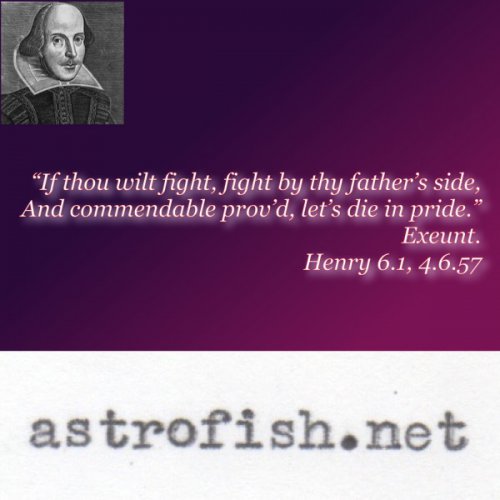Geek Pride
In Star Trek, the original — Capt. Kirk is legend for his handling of a certain No Win scenario, the “Kobayashi Maru.” OK, so that’s geek cred, and that’s original Star Trek, none of this later, spin-off material and subsidiary subservient franchises. Nope, just think Star Trek with Eddie Murphy’s “Capt. Kirk” commentary.
“If thou wilt fight, fight by thy father’s side,
And commendable prov’d, let’s die in pride.”
Exeunt.
Henry 6.1, 4.6.57
The way I heard it? There was high-pitched, possibly female, reading the part of the son, and Talbot sounded like an old man. Previously, in the play, Talbot was the badass swordsman, the English scourge of France, just his name alone scared away the numerically superior French fighters.
So the long speech that precedes this ending? Die alone, the son was trying to convince the dad to leave since the son’s death was no big deal but the dad’s death was a real victory for the French, and there was always an option to flee. The son would stand and fight, and his own loss of life no great claim for the enemy, like, no bragging rights. One, or the other could survive, but not both. It’s a no-win scenario. Didn’t strike me the first time, but this third time?
Star Trek’s “Kobayashi Maru,” well except Shakespeare was close to four-hundred years earlier. In life, for real, not just on stage or TV, there’s a certain time when there is that “No-win” scenario. I used to try and prove geek credit by citing Star Trek, but I think I’ll go back to my roots, “Talbot, end of Henry 6.1? Both die? You know the scene?”
Geek Pride
Took a little digging, but I knew I had used that speech before, in 2015, part of the Saturn in Sagittarius material overview. Almost three years have passed by, Saturn is currently in Capricorn, and I’m back to toying with this series of early plays.
One podcast I have enjoyed immensely — cf., ChopBard — just started on the series, with that introduction, I knew I mentioned this years ago, that the wordplay and poetry in portions of the Henry 6 series shows the pathway to Shakespeare’s Richard III.
The Trilogy that is Road to Shakespeare’s The Tragedy of Richard the Third — too long of a title?
Geek Pride
My Geek Pride was trying to tie an oblique Star Trek reference to an early Shakespeare play. Turns out I was largely less than successful with the tie-in. Didn’t stop me from trying to find a previous reference point, to make this a neater connection.
Still, from a recent podcast, as noted above, so I’m quoting a guy who is quoting a source that quotes other sources — might not be the most reliable data — just noting that. In his podcast, though, he was citing recent scholarship that suggested the one of the parts Shakespeare contributed to Henry 6.1 would be Talbot’s scene, notably that dialogue. Listening, that first or second time, date would suggest third time at least, I recall being moved by the majesty of the language, clearly the language paves a way towards Shakespeare’s King Richard the Third.
Can I legitimately connect early Shakespeare work to an archetype “Star Trek?”
Judges?
